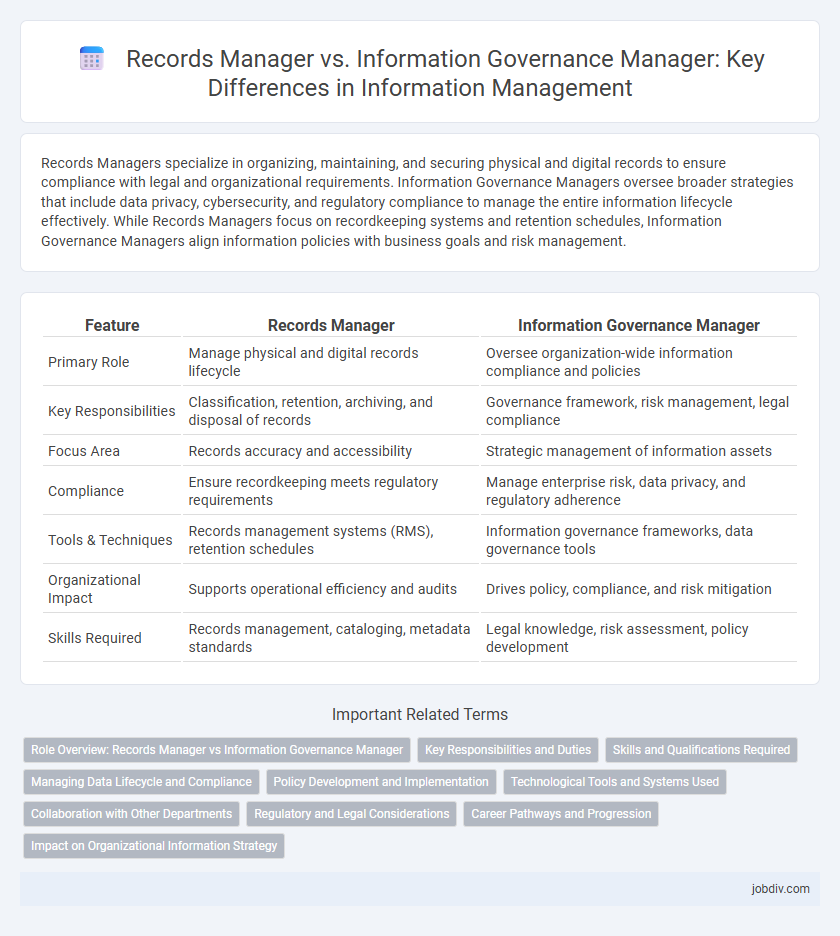Records Managers specialize in organizing, maintaining, and securing physical and digital records to ensure compliance with legal and organizational requirements. Information Governance Managers oversee broader strategies that include data privacy, cybersecurity, and regulatory compliance to manage the entire information lifecycle effectively. While Records Managers focus on recordkeeping systems and retention schedules, Information Governance Managers align information policies with business goals and risk management.
Table of Comparison
| Feature | Records Manager | Information Governance Manager |
|---|---|---|
| Primary Role | Manage physical and digital records lifecycle | Oversee organization-wide information compliance and policies |
| Key Responsibilities | Classification, retention, archiving, and disposal of records | Governance framework, risk management, legal compliance |
| Focus Area | Records accuracy and accessibility | Strategic management of information assets |
| Compliance | Ensure recordkeeping meets regulatory requirements | Manage enterprise risk, data privacy, and regulatory adherence |
| Tools & Techniques | Records management systems (RMS), retention schedules | Information governance frameworks, data governance tools |
| Organizational Impact | Supports operational efficiency and audits | Drives policy, compliance, and risk mitigation |
| Skills Required | Records management, cataloging, metadata standards | Legal knowledge, risk assessment, policy development |
Role Overview: Records Manager vs Information Governance Manager
A Records Manager focuses on the systematic control, maintenance, and disposition of records to ensure compliance and accessibility throughout their lifecycle. An Information Governance Manager oversees broader policies, risk management, and strategic frameworks to optimize information use across the organization while ensuring regulatory compliance. Both roles require expertise in data security, regulatory standards, and information management, but the Records Manager concentrates more on operational record-keeping, whereas the Information Governance Manager addresses enterprise-wide information governance strategies.
Key Responsibilities and Duties
A Records Manager oversees the systematic control of company records, ensuring proper creation, maintenance, and disposal in compliance with legal and regulatory requirements, while managing retention schedules and archival processes. An Information Governance Manager develops and enforces policies for data privacy, security, and compliance across the organization, focusing on risk management and aligning data practices with corporate governance frameworks. Both roles prioritize regulatory adherence and data integrity but differ in scope, with Records Managers focusing on physical and digital records management and Information Governance Managers addressing broader information lifecycle and compliance strategies.
Skills and Qualifications Required
Records Managers require expertise in document control, classification systems, and compliance with records retention policies, often holding certifications like CRM (Certified Records Manager). Information Governance Managers must possess advanced knowledge in regulatory frameworks, data privacy laws such as GDPR and HIPAA, and risk management strategies, typically supported by qualifications in information security or data governance. Both roles demand strong analytical skills, proficiency in information technology, and the ability to develop and implement organizational policies.
Managing Data Lifecycle and Compliance
Records Managers specialize in managing the entire data lifecycle, including the creation, retention, and secure disposal of records in compliance with legal and regulatory requirements. Information Governance Managers oversee broader compliance frameworks, integrating policies for data privacy, security, risk management, and regulatory adherence across the organization. Both roles prioritize aligning data management practices with industry standards to mitigate risks and ensure regulatory compliance throughout the information lifecycle.
Policy Development and Implementation
Records Managers specialize in developing and implementing policies focused on the efficient capture, organization, and retention of records in compliance with legal and regulatory requirements. Information Governance Managers oversee broader policy frameworks that encompass data privacy, security, risk management, and compliance across all organizational information assets. Effective policy development and implementation by both roles ensure corporate data integrity, regulatory adherence, and optimized information lifecycle management.
Technological Tools and Systems Used
Records Managers typically utilize electronic document management systems (EDMS), records retention software, and automated workflow tools to ensure accurate classification, storage, and retrieval of physical and digital records. Information Governance Managers leverage advanced analytics platforms, data loss prevention (DLP) solutions, and compliance management software to enforce policies across information lifecycle, aligning with regulatory requirements. Both roles benefit from integration with cloud-based repositories and AI-driven technologies, but Information Governance Managers emphasize broader risk mitigation and policy enforcement frameworks.
Collaboration with Other Departments
Records Managers collaborate closely with IT, legal, and compliance teams to ensure accurate data capture and secure storage, facilitating seamless information retrieval. Information Governance Managers coordinate cross-functional departments including risk management, security, and business units to develop policies that align with regulatory requirements and organizational goals. Both roles require effective interdepartmental communication to maintain data integrity and support overall information strategy.
Regulatory and Legal Considerations
Records Managers ensure compliance with regulatory requirements by managing document retention schedules and safeguarding sensitive information to prevent legal risks. Information Governance Managers develop policies that align with data protection laws such as GDPR and HIPAA, overseeing audits to ensure organizational adherence. Both roles play critical parts in mitigating legal liabilities through rigorous control of information lifecycle and regulatory mandates.
Career Pathways and Progression
Records Managers typically begin their careers managing physical and digital records, focusing on organization, compliance, and retrieval efficiency. Progression to an Information Governance Manager role often involves acquiring expertise in data privacy, risk management, and policy development, overseeing broader organizational information assets. Career pathways highlight a transition from tactical records control to strategic governance, requiring advanced knowledge of regulatory frameworks and cross-departmental collaboration.
Impact on Organizational Information Strategy
Records Managers focus on the systematic control of an organization's records to ensure compliance, accessibility, and efficient retrieval, directly supporting information lifecycle management. Information Governance Managers develop comprehensive frameworks that align data policies, privacy, security, and regulatory requirements with business objectives, enhancing risk management and data integrity. The combined efforts of both roles drive a robust organizational information strategy by balancing operational efficiency with strategic compliance and governance priorities.
Records Manager vs Information Governance Manager Infographic

 jobdiv.com
jobdiv.com